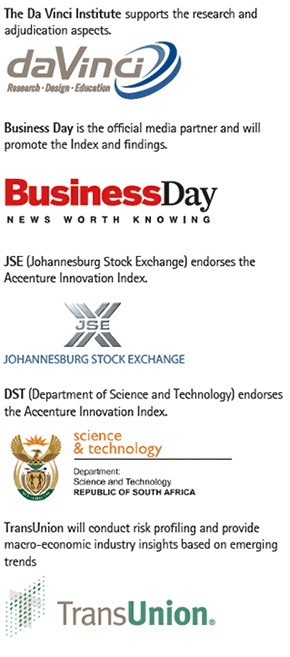Index lays the foundation for benchmarking innovation
by Evan Pickworth and David Jackson,
2013-11-28 12:09:37.0
ACCENTURE took a bold step this year when it decided to track innovation trends across the country. With unemployment levels among the worst in the world and many businesses struggling to make ends meet, the index was launched with the aim of promoting business growth and the development of new, sustainable enterprises that will spur job creation.
The company determined that to do this properly it would mean breaking the shackles of tradition — to create an innovation index that simply followed the herd would just be wrong.
While similar indices measure innovation at country level or innovation concepts, the Accenture Innovation Index aims to measure and reward innovation ecosystems and commercial concepts across the public and private sectors in the South African marketplace.
With 190 entries received from a broad cross-section of organisations, Accenture can today say the index has laid the foundation for an accurate benchmark of innovation in this country.
William Mzimba, CEO of Accenture SA, says what distinguishes the Accenture Innovation Index from other innovation initiatives is that two categories of innovation were identified. "We particularly wanted to find ‘Innovation Masters’ — companies for whom innovation exudes through everything they do."
The Innovation Masters category was open to any organisation regardless of size, industry or listing. The process explored how innovation is managed in an organisation and looked at a number of key aspects. These aspects included how companies encourage innovation with their employees, as well as how they leverage technology and service delivery to innovate. The social and ethical aspects also consider whether companies are innovating in a space in which they remain socially and environmentally responsible.
"Our approach seeks to uncover how companies have inculcated innovation into their processes and systems, as well as their rewards and strategies," says Mzimba.
The Innovation Masters — First National Bank and Paperight — were lauded for their systematic approach to instilling innovation as part of their organisational culture.
In addition to seeking Innovation Masters, Accenture and its partners looked for concepts that would have an impact on social values.
"I haven’t come across any innovation awards or initiatives that look at both — Innovation Masters and concepts," says Mzimba. "We have never seen such significant interest in the first year of an initiative as we have seen with this innovation index. This is not just a South African initiative. The innovation concept initiative has been driven by Accenture in other parts of the world. We chose to adopt it and expand on it in this country because as an organisation, we live and breathe innovation every day."
The results highlighted innovation as key to economic growth and fostering entrepreneurialism and "intrepreneurialism". Mzimba was pleased when the research revealed that companies which actively used innovation agendas had higher return on investment, and there was a direct correlation to increased standards of living through social programmes.
The success is also indicative of the important contributory role made by Accenture’s various business partners: The Da Vinci Institute for its contribution to the methodology as well as the adjudication and judging processes; TransUnion for the double credit vetting process; and Business Day’s media partnership.
The endorsements by the JSE, the Department of Science and Technology and Minister Derek Hanekom, and the commissioner for the Companies and Intellectual Property Commission, Astrid Ludin, remain critical to the success of the initiative.
Mzimba says that Accenture is working to bring government on board in encouraging innovation, while assisting them to define integrated processes around their different innovation agencies.
"In this regard, government needs to set the right policy framework and to provide support for innovation in the country, as is the case in the US for example," says Mzimba.
"The Accenture Innovation Index is an authoritative guide that will enable companies across the country to understand the importance of innovation and how they can go about achieving it. It includes a benchmark that we hope senior executives will use to formulate policy and organisational strategies to achieve innovation.
"The index will be compiled annually, culminating in a body of knowledge about innovation."
Companies that enter the Innovation Index receive a "dashboard", which indicates how they score in relation to the national index. The dashboard compares their performance to the national average, as well as the top performers of the individual categories.
For companies that didn’t enter, it is not too late to take the 2013 questionnaire and receive a dashboard. Accenture encourages all South African organisations to ascertain their innovation ranking.
"This is a continuous process aimed at getting companies to improve their innovation strategies," says Mzimba.
Says Science and Technology Minister Derek Hanekom: "We applaud Accenture and The Da Vinci Institute for investing in this initiative. We look forward to the growth of our economy through such initiatives, and the enhanced quality of life of South Africans."

Accenture CEO William Mzimba says government needs to set the right policy framework and to provide support for innovation in the country, as is the case in the US. Picture: SUNDAY TIMES
ACCENTURE took a bold step this year when it decided to track innovation trends across the country. With unemployment levels among the worst in the world and many businesses struggling to make ends meet, the index was launched with the aim of promoting business growth and the development of new, sustainable enterprises that will spur job creation.
The company determined that to do this properly it would mean breaking the shackles of tradition — to create an innovation index that simply followed the herd would just be wrong.
While similar indices measure innovation at country level or innovation concepts, the Accenture Innovation Index aims to measure and reward innovation ecosystems and commercial concepts across the public and private sectors in the South African marketplace.
With 190 entries received from a broad cross-section of organisations, Accenture can today say the index has laid the foundation for an accurate benchmark of innovation in this country.
William Mzimba, CEO of Accenture SA, says what distinguishes the Accenture Innovation Index from other innovation initiatives is that two categories of innovation were identified. "We particularly wanted to find ‘Innovation Masters’ — companies for whom innovation exudes through everything they do."
The Innovation Masters category was open to any organisation regardless of size, industry or listing. The process explored how innovation is managed in an organisation and looked at a number of key aspects. These aspects included how companies encourage innovation with their employees, as well as how they leverage technology and service delivery to innovate. The social and ethical aspects also consider whether companies are innovating in a space in which they remain socially and environmentally responsible.
"Our approach seeks to uncover how companies have inculcated innovation into their processes and systems, as well as their rewards and strategies," says Mzimba.
The Innovation Masters — First National Bank and Paperight — were lauded for their systematic approach to instilling innovation as part of their organisational culture.
In addition to seeking Innovation Masters, Accenture and its partners looked for concepts that would have an impact on social values.
"I haven’t come across any innovation awards or initiatives that look at both — Innovation Masters and concepts," says Mzimba. "We have never seen such significant interest in the first year of an initiative as we have seen with this innovation index. This is not just a South African initiative. The innovation concept initiative has been driven by Accenture in other parts of the world. We chose to adopt it and expand on it in this country because as an organisation, we live and breathe innovation every day."
The results highlighted innovation as key to economic growth and fostering entrepreneurialism and "intrepreneurialism". Mzimba was pleased when the research revealed that companies which actively used innovation agendas had higher return on investment, and there was a direct correlation to increased standards of living through social programmes.
The success is also indicative of the important contributory role made by Accenture’s various business partners: The Da Vinci Institute for its contribution to the methodology as well as the adjudication and judging processes; TransUnion for the double credit vetting process; and Business Day’s media partnership.
The endorsements by the JSE, the Department of Science and Technology and Minister Derek Hanekom, and the commissioner for the Companies and Intellectual Property Commission, Astrid Ludin, remain critical to the success of the initiative.
Mzimba says that Accenture is working to bring government on board in encouraging innovation, while assisting them to define integrated processes around their different innovation agencies.
"In this regard, government needs to set the right policy framework and to provide support for innovation in the country, as is the case in the US for example," says Mzimba.
"The Accenture Innovation Index is an authoritative guide that will enable companies across the country to understand the importance of innovation and how they can go about achieving it. It includes a benchmark that we hope senior executives will use to formulate policy and organisational strategies to achieve innovation.
"The index will be compiled annually, culminating in a body of knowledge about innovation."
Companies that enter the Innovation Index receive a "dashboard", which indicates how they score in relation to the national index. The dashboard compares their performance to the national average, as well as the top performers of the individual categories.
For companies that didn’t enter, it is not too late to take the 2013 questionnaire and receive a dashboard. Accenture encourages all South African organisations to ascertain their innovation ranking.
"This is a continuous process aimed at getting companies to improve their innovation strategies," says Mzimba.
Says Science and Technology Minister Derek Hanekom: "We applaud Accenture and The Da Vinci Institute for investing in this initiative. We look forward to the growth of our economy through such initiatives, and the enhanced quality of life of South Africans."






















Change: -1.52%
Change: -1.70%
Change: -1.84%
Change: -1.60%
Change: -1.52%
Data supplied by Profile Data
Change: -0.64%
Change: 0.12%
Change: -1.52%
Change: 0.00%
Change: 0.10%
Data supplied by Profile Data
Change: 0.73%
Change: -0.11%
Change: 0.63%
Change: 1.18%
Change: 1.40%
Data supplied by Profile Data
Change: 0.72%
Change: 0.71%
Change: -0.13%
Change: 0.33%
Change: -0.15%
Data supplied by Profile Data